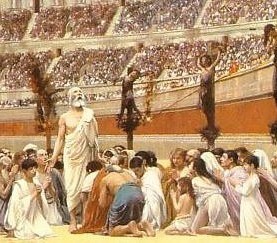SIGNS of the LAST DAYS: Increase in persecution of Christians

Can Christians celebrate Hanukkah?
 Hanukkah, the Jewish Festival of Lights, began Sunday, a holiday which starts on the 25th of the Jewish month of Kislev and lasts for eight days. In the Gregorian calendar it begins December 2 and concludes December 10 in 2018. Hanukkah is also known as the Feast of Dedication, and while it is not written about in the Old Testament, it was an observance Jesus took part in during his earthly life.
Hanukkah, the Jewish Festival of Lights, began Sunday, a holiday which starts on the 25th of the Jewish month of Kislev and lasts for eight days. In the Gregorian calendar it begins December 2 and concludes December 10 in 2018. Hanukkah is also known as the Feast of Dedication, and while it is not written about in the Old Testament, it was an observance Jesus took part in during his earthly life.
“At that time the Feast of Dedication took place at Jerusalem. It was winter, and Jesus was walking in the temple, in the colonnade of Solomon,” John 10:22-23 recounts.
The holiday is fundamentally about the miracle of God being with the Jewish people during a time of great hardship and persecution.
The Persecution of Christians Today
Let me start by saying that many people find it very surprising, even unbelievable, that in today’s world the largest group of people being persecuted for their faith are Christians. This seems all the more unusual because Christianity is the world’s largest religion. I am fully aware that other religions, whether Buddhist, Hindu, Muslim or others also suffer in various contexts, and we shall address these situations in subsequent articles. However, for the present we will focus on Christians, due to the urgency of the situation. Incredibly, more than 200 million people in over 60 nations are being denied their basic human rights for one reason only: they are Christians. The main reason Christians are being persecuted today is the simple fact that Christianity is growing fastest in countries where human rights are being violated or do not exist. One of my tasks as director of the Religious Liberty Commission is to represent these Christians – both Catholic and Protestant – at the United Nations Commission for Human Rights in Geneva, as well as in other contexts. I would therefore like to give a brief analysis of the global situation regarding persecution of Christians. This analysis is based on reports from 114 countries and personal visits to many countries where Christian people suffer.
THE GREAT PARADIGM SHIFT
The persecution of Christians goes hand-in-hand with some important trends taking place around the world. I’d like to name five:
1. Conflicts tend increasingly to occur within states, rather than between them. In such situations, religious tensions are likely to increase. We are all familiar with the heart-rending struggles in Kosovo, Bosnia, Sri Lanka, Sudan, Chechnya, Northern Ireland and East Timor, to name but a few.
The whole structure of the UN was created after the Second World War, and is designed to solve conflicts between states, not within them. Human rights are increasingly at the core of civil conflict, and added to that is the way countries like China, Russia and Indonesia interpret the whole issue of human rights – in other words, that human rights are each country’s own internal affair. This places two fundamental principles on a collision course with one another: the sovereignty of the state, and the universal nature of human rights.
2. Many countries with a colonial past are seeking their own identity. Very often, this has strong ties to a religion. We see this clearly, for example, in Asia: Pakistan adheres to Islam, India to Hinduism, Indonesia also to Islam, and Sri Lanka to Buddhism.
It is worth noting that the search for a national identity is strongest in five of the eight countries that together make up more than half of the world population. These are China, India, Indonesia, Bangladesh and Pakistan. In each of these countries, Christians are finding themselves in increasingly tense situations, because they are painted as bearers of the religion brought by former colonial powers, and thus are considered a threat to national harmony.
3. Developments in the Muslim world are likely to have an increasing impact on the lives of Christians within the next decade. The population growth in the Arab world is 4.3 per cent, compared with economic growth of only 0.5 per cent. The population is very young, and this creates the conditions for the growth of radical elements.
4. There is a great difference between the West’s view of reality and that of the developing countries. The West often interprets global thinking as its own world view written large. But ways of thinking, interpretation and culture differ far more than Westerners think. The West must be ready to listen, and to listen as never before.
5. I would like to say something here about the growth of the Christian Church. There is a clear misunderstanding in Europe today that religion is no longer relevant to the modern world. Nothing could be further from the truth. The amazing fact is that of the world’s six billion people, only a tiny proportion – 151 million – call themselves atheists. There are two billion Christians, 1.2 billion Muslims, 786 million Hindus and 362 million Buddhists. Religion is, and will continue to be, at the very centre of our world, at the centre of the conflicts within it, and also at the centre of how these conflicts are resolved in the next Millennium.
These five paradigm shifts are the principle reasons Christians are being persecuted today, and most likely why it will continue in the future. However, there is a sixth paradigm shift that is very important. This is partnership. The European Union is an example of political partnership, and in the financial world, we hear almost daily of some significant merger. The trend toward partnership is clear, and all of us can work very effectively together to help guarantee the human rights of Christians. At the same time, I want to stress again that religious liberty should apply to every person on this planet, regardless of their religion. The broadest international basis we have for cooperation in helping suffering Christians is the United Nations Declaration on Human Rights of 1949, especially Articles 18 and 19.
Simply put, they say that every person should have the freedom to adhere to and practice the religion he or she chooses, and to change religion without coming under pressure as a result. This obviously includes the right to keep one’s religion without being forced into another. In fact, religious rights could be said to be a principle building block, even the cornerstone, of human rights.
WHAT DO WE MEAN BY PERSECUTION?
It is clear that not all persecution has to do with religion. Many people are persecuted for ethnic, social and political reasons, but they also happen to be Christians. How do we know the difference between that kind of persecution and persecution based on their faith alone? I think we can answer it by asking a simple question: “If a person changes their religion to the majority religion of the country, will things get better for them?” If the answer is “yes,” then it seems that the persecution is solely on religious grounds. And by persecution I mean the lack of full human rights, together with some kind of suffering.
Literally hundreds of thousands of people today are being killed, brutalized, sold as slaves, imprisoned, tortured, threatened, discriminated against and arrested solely because they are Christians. They are being subjected to persecution and suffering, the extent of which we can hardly begin to comprehend, because of their faith. They ask us to shatter the silence and use our voices to express their cries. This plea is directed at us, wherever we are, today.
Persecution seems to pass through three phases. The first is disinformation. Disinformation begins more often than not in the media. Through printed articles, radio, television and other means, Christians are robbed of their good reputation and their right to answer the accusations made against them. The public opinion that easily results from being constantly fed such disinformation will not protect Christians from the second step, which is discrimination. Discrimination relegates Christians to a ‘second-class’ citizenship with inferior legal, social, political and economic standing than the majority in the country. The third stage is persecution. Once the first two steps have been taken, persecution can be practiced without normal protective measures taking place. Persecution can arise from the state, the police or military, extreme organizations, mobs, paramilitary groups, or representatives of other religions.








